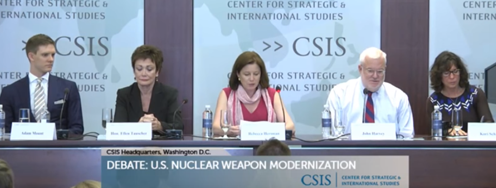Budget Cutters Take Note
Republicans and the White House are in tense negotiations to hammer out a deal on long-term deficit reductions. For once, both political parties are keeping defense cuts on the table. The mood in Washington is reflected in recent comments by Secretary of Defense Leon Panetta:
"The days of large growth and unlimited defense budgets are over. Our challenge will be to design budgets that eliminate wasteful and duplicative spending while protecting those core elements that we absolutely need for our nation's defense."
He's right. America's national security budget has not only expanded to levels higher than we've seen since the Cold War, it's also supporting Cold War era programs that fail to meet the security threats of this century.
Chief among these excessive programs are the nation's nuclear weapons and related activities - costing roughly $54 billion each year. The US has about 5,000 active nuclear weapons that most Americans don't realize still exist.
While not all of this funding could be on the table - we wouldn't want to eliminate programs that keep nuclear materials out of the hands of terrorists, for example - there are many nuclear weapons programs that could be pared down or eliminated.
A recent spate of articles explores the ways to scale back nuclear weapons budgets, moving us closer to a national security structure that meets current military needs as well as towards a world free of the threats posed by nuclear weapons.
On today's Atlantic Politics blog, Joe Cirincione argues that Congress should not authorize additional spending on nuclear weapons until a nuclear roadmap has been put in place that takes current needs into account.
Spending on weapons designed to fight last century's conflict drains funds from weapons needed for today's challenges. The services already feel the nuclear budget burden. In 2009, the Navy said it would have to cut 56 vessels from its shipbuilding budget in order to afford the 12 new nuclear-armed subs. The Navy recognizes the problem, but does not have a solution.This is where Congress comes in. Members should not approve any of these new programs without a nuclear roadmap.
On the Stimson Center blog the Will and the Wallet, Ploughshares Fund research associate Ben Loerkhe elaborates, offering up three specific programs currently funded for the 2012 budget that could come under the knife.
- $1.1 billion for the Ohio-class SSBN replacement program: The Navy is setting out to field 12 new ballistic missile submarines between now and 2040. The total program cost could top $101 billion, as estimated by the Congressional Budget Office.
- $197 million for the next generation strategic bomber: The Air Force wants to replace its aging fleet of B52 bombers with a new long-range bomber, potentially including a nuclear mission. The total program cost has been estimated at $55 billion.
- $279 million for the B61 Life Extension Program: The National Nuclear Security Administration is looking to extend the service life of and add capabilities to the B61 bomb – soon to be the only “tactical” nuclear weapon left in the active stockpile. Total program could cost an estimated $5 billion.
On Talking Points Memo, William Hartung assesses the chances that such cuts might actually make it through Congress.
Not only have a growing list of former secretaries of state and defense, presidents and prime ministers, scientists and retired military officials called for the elimination of nuclear weapons, but if pushed by budgetary realities so would many current U.S. military leaders. While they won't say so publicly, if forced to choose between nukes and major conventional systems it is my bet that nukes would lose out in that particular budget battle.
Finally, in May's issue of Arms Control Today, Daryl Kimball succinctly argues that the United States' fiscal and strategic needs would be better served by shrinking the nuclear arsenal.
Maintaining and modernizing U.S. strategic forces at current, higher levels is not only unnecessary, but prohibitively expensive. If Congress and the White House are serious about reducing defense expenditures by $400 billion by 2023 to reduce the ballooning federal deficit, they should start by deferring or curtailing the Pentagon’s ambitious plan to upgrade and replace the strategic triad.
The drumbeat is starting to build. It's time to take a closer look at the nation's nuclear spending.




